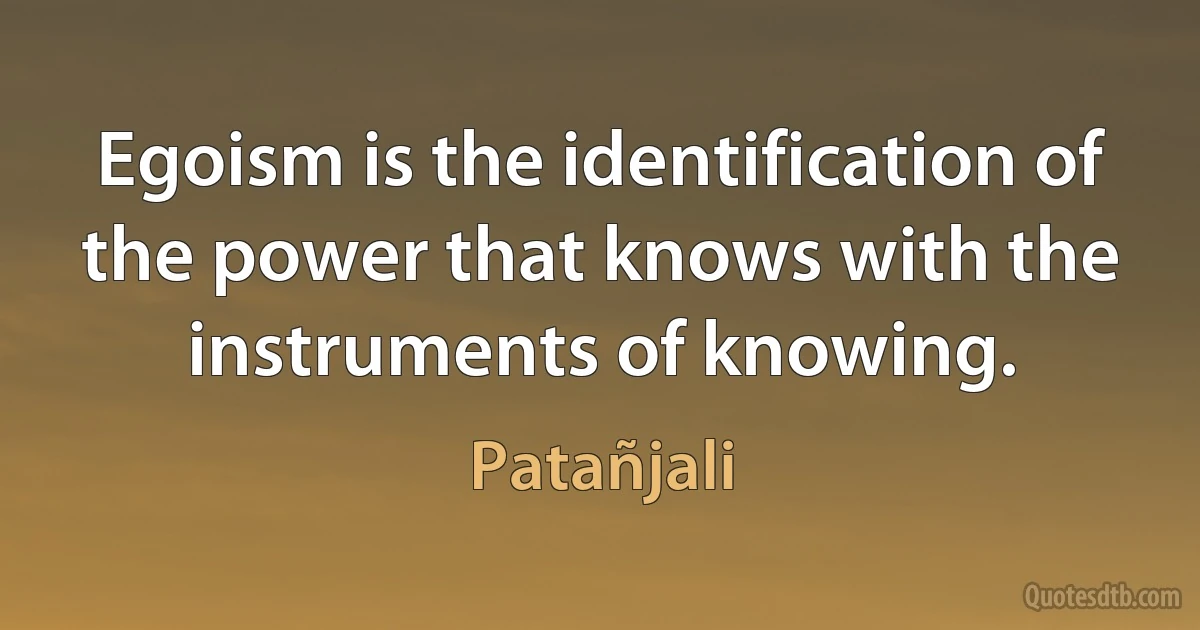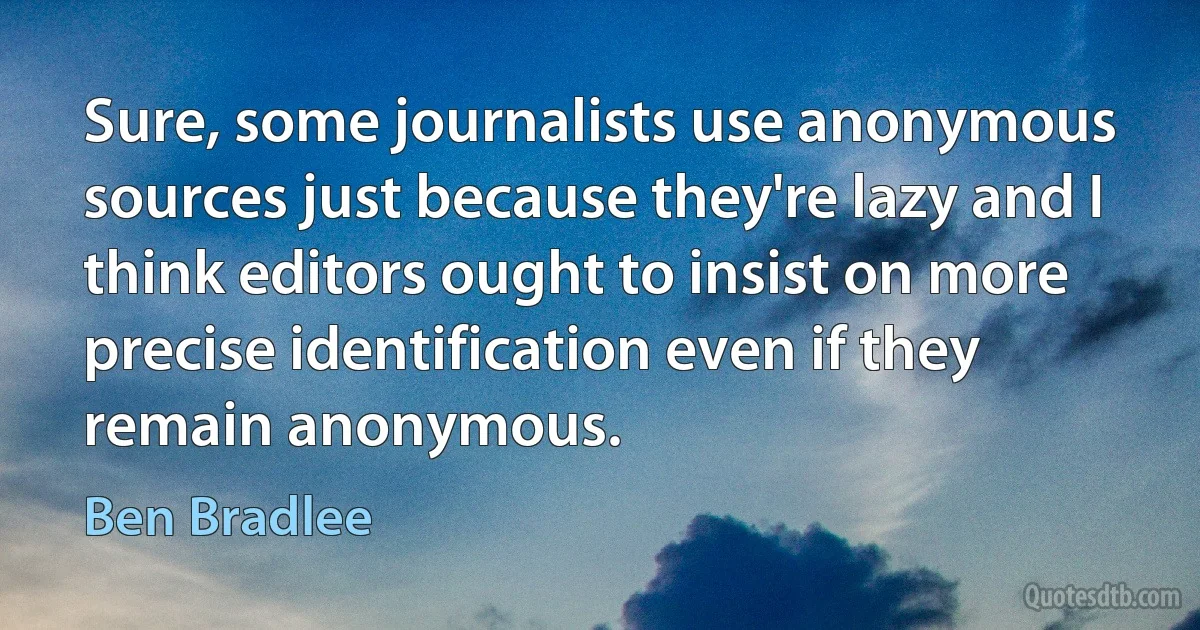Identification Quotes - page 3
The Apollonian and Dionysian, two great western principles, govern sexual personae in life and art. My theory is this: Dionysus is identification, Apollo objectification. Dionysus is the empathic, the sympathetic, emotion transporting us into other people, other palaces, other times. Apollo is the hard, cold separation of western personality and categorical thought. Dionysus is energy, ecstasy, hysteria, promiscuity, emotionalism -- heedless indiscriminateness of idea or practice. Apollo is obsessiveness, voyeurism, idolatry, fascism -- frigidity and aggression of the eye, petrification of objects. ... The quarrel between Apollo and Dionysus is the quarrel between the higher cortex and the older limbic and reptilian brains.

Camille Paglia
[Henry] James's repressions and evasions are many, varied and exhausting. Why more people are not seen rushing shrieking from libraries, shredding James novels in their hands, I cannot say. I used to wonder whether enthusiasm for him was based on identification, since his passive, tentative heroes resemble many academics. Perhaps what is intolerable is his enshrinement in a soporific criticism. So much must be overlooked to crown him with laurel.

Camille Paglia
Intuition is a comprehensive grip of the principle of universality, and when it is functioning there is, momentarily at least, a complete loss of the sense of separateness. At its highest point, it is known as that Universal Love which has no relation to sentiment or to the affectional reaction but is, predominantly, in the nature of an identification with all beings. Then is true compassion known; then does criticism become impossible; then, only, is the divine germ seen as latent in all forms.

Alice Bailey
Our amendment earmarks $10 million out of the account called Army Research, Development, Test and Evaluation. The money would go to a research program administered by the Army Medical Research and Materiel Command in the DoD, for identifying the biological mechanisms behind the illnesses - particularly the neurological and immunological ones; the chronic disease effects; better diagnostic criteria for the illnesses; and identification of treatments. The MRMC will design a research plan for that purpose, relying heavily on the expertise outside DoD and the VA. It will be subject to peer review by experts, a significant number of which will be independent of DoD.$10 million will have a large impact on veterans who rely on the government to take care of them after they have taken care of us.I urge my colleagues to support the Kucinich-Shays-Sanders amendment. Vote 'yes' to restore research funding for Gulf War Illnesses.

Dennis Kucinich
Many of these constitutional violations have become routine. For instance, even though it's illegal for police officers to detain a person – even briefly – without reasonable suspicion, it's become common practice for officers in Ferguson to stop pedestrians and request identification for no reason at all. And even in cases where police encounters start off as constitutionally defensible, we found that they frequently and rapidly escalate – and end up blatantly and unnecessarily crossing the line.

Eric Holder
The Weinreichs have laid out, with numerical precision, the outlines of a world, of a fantastic land in which it would behoove you to know how to say, in Yiddish,
250. What is the flight number?
1372. I need something for a tourniquet.
1379. Here is my identification.
254. Can I go by boat/ferry to----?

Michael Chabon
Those who, in the nineteenth century, argued the dangers of a mass democracy in which a majority of the voters would have no stake in the country at all, had reason to be fearful. But the remedy is not to restrict the franchise to those who own property: it is to extend the ownership of property to the largest possible majority of those who have the vote. The widespread ownership of private property is crucial to the survival of freedom and democracy. It gives the citizen a vital sense of identification with the society of which he is a part. It gives him a stake in the future-and indeed, equally important, in the present. It creates a society with an inbuilt resistance to revolutionary change.

Nigel Lawson
The hearer of myth, regardless of his level of culture, when he is listening to a myth, forgets, as it were, his particular situation and is projected into another world, into another universe which is no longer his poor little universe of every day.... The myths are true because they are sacred, because they tell him about sacred beings and events. Consequently, in reciting or listening to a myth, one resumes contact with the sacred and with reality, and in so doing one transcends the profane condition, the "historical situation." In other words one goes beyond the temporal condition and the dull self-sufficiency which is the lot of every human being simply because every human being is "ignorant" - in the sense that he is identifying himself, and Reality, with his own particular situation. And ignorance is, first of all, this false identification of Reality with what each one of us appears to be or to possess.

Mircea Eliade
I just wanted to say something about (...) my resentment of the identification of this country of Britain with royalty. As if we have nothing else to offer as a culture – the country of my birth. The great contribution, of the English anyway, to the world is literature and language. That language and literature is, in fact, in its tradition quite extensively republican and democratic. I mean our Blake, Milton, our Shelley, many many other great writers, poetry and prose, have been against the idea that Britain is a feudal or monarchic system. One of the great aspects of that tradition is represented by the name Thomas Paine, who is the moral author of your Declaration of Independence. In fact, one of the great accomplishments of the English republican movement, if you like, is the American Declaration of Independence. So it has always struck me as rather bizarre that there is this cult in the United States of English royalism – just the sort of thing I left England to get away from.

Christopher Hitchens
Equality gives rise to challenging questions which are not altogether easy to answer... a = a and a = b are obviously statements of differing cognitive value; a = a holds a priori and, according to Kant, is to be labeled analytic, while statements of the form a = b often contain very valuable extensions of our knowledge and cannot always be established a priori. The discovery that the rising sun is not new every morning, but always the same, was one of the most fertile astronomical discoveries. Even to-day the identification of a small planet or a comet is not always a matter of course. Now if we were to regard equality as a relation between that which the names 'a' and 'b' designate, it would seem that a = b could not differ from a = a (i. e. provided a = b is true). A relation would thereby be expressed of a thing to itself, and indeed one in which each thing stands to itself but to no other thing.

Gottlob Frege
As you listen to the thought, you feel a conscious presence - your deeper self - behind or underneath the thought, as it were. The thought then loses its power over you and quickly subsides, because you are no longer energizing the mind through identification with it. This is the beginning of the end of involuntary and compulsive thinking. When a thought subsides, you experience a discontinuity in the mental stream - a gap of "no-mind." At first, the gaps will be short, a few seconds perhaps, but gradually they will become longer. When these gaps occur, you feel a certain stillness and peace inside you.

Eckhart Tolle
To let go of judgment does not mean that you don't see what they do. It means that you recognize their behavior as a form of conditioning, and you see it and accept it as that. You don't construct an identity out of it for that person.
That liberates you as well as the other person from identification with conditioning, with form, with mind. That liberates you as well as the other person from identification with conditioning, with form, with mind. The ego then no longer runs your relationships.

Eckhart Tolle
The part of these immigration bills that I hate most is the requirement for new forms of identification and surveillance of US citizens. I gather this is supported by nearly everyone in Congress. Orwellian surveillance is not controversial in the US, where "Land of the Free" has been replaced with "Let me see your papers."
When the US adopted a requirement for US citizens to prove their citizenship in order to get a job, I vowed I would never do so. I will never again be an employee in the US.

Richard Stallman
Still, there are moments when one feels free from one's own identification with human limitations and inadequacies. At such moments, one imagines that one stands on some spot of a small planet, gazing in amazement at the cold yet profoundly moving beauty of the eternal, the unfathomable: life and death flow into one, and there is neither evolution nor destiny; only being.

Albert Einstein



